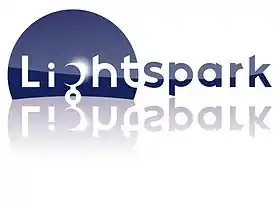Lightspark
Lightspark is a free and open-source SWF player released under the terms of the GNU Lesser General Public License (LGPL) version 3.[1]
 | |
| Developer(s) | Alessandro Pignotti |
|---|---|
| Stable release | 0.8.3[1]
/ July 5, 2020 |
| Repository | |
| Written in | C++ |
| Operating system | Linux, FreeBSD, Windows |
| Type | Multimedia |
| License | LGPLv3 |
| Website | lightspark |
Features
Lightspark supports most of ActionScript 3.0 and has a Mozilla-compatible plug-in.[2] It will fall back on Gnash, a free SWF player on ActionScript 1.0 and 2.0 (AVM1) code.
Lightspark supports OpenGL-based rendering and LLVM-based ActionScript execution and uses OpenGL shaders (GLSL). The player is compatible with H.264 Flash videos on YouTube.
Portability
The Lightspark player is completely portable.[3] It has been successfully built on Ubuntu 11.04 (Natty Narwhal) on PowerPC, x86, ARM and AMD64 architectures.[4] Lightspark has a Win32 branch for Microsoft Visual Studio[5] and introduced a Mozilla-compatible plug-in for Windows in version 0.5.3. Since then, the project hasn't seen any official Windows release, but newer versions are continuously built and made available through Jenkins.[6]
Version history
Changes between versions:
| Lightspark version | Release date | Notes |
|---|---|---|
|
0.8.3 |
5 July 2020 |
|
|
0.8.2 |
15 September 2019 |
|
|
0.8.1 |
2 June 2018 |
|
|
0.8.0 |
14 July 2017 | Make NPAPI plugin windowless, now it works on Firefox > version 52, add PPAPI plugin for use with Chromium-based browsers, switch to SDL2/SDL2_mixer for everything except Firefox plugin, the plugin uses GTK2 to interact with Firefox, so the GTK2 dependency is only needed when building the Firefox plugin, removes audio plugins as audio is now handled via SDL2_mixer for all platforms, removes the PulseAudio dependency, the configuration setting [audio] is no longer needed, implement rendering of embedded fonts in TextFields, fix handling of multiple streams in SDL, audio plugin, adds dependency on sdl_mixer, switch to internal XML parsing (based on pugixml), removes dependency on libxml++, compilation using Clang possible, implement several missing opcodes, fix serialization, implement data generation mode, support for avmplus classes (mostly stubs), Support LLVM up to version 4.0, fix event dispatcher handling, several fixes for object initialization, partially implement AMF0 decoding, complete rework of XML subsystem, Support embedded audio, Implement JSON parsing.[8] |
|
0.7.2 |
16 March 2013 | Improved image support: alpha in palettes, abbreviated JPEGs, improved embedded font parsing and text positioning, open links in a browser (plugin only), bitmapData improvements, fixed many crashes[8] |
|
0.7.1 |
23 December 2012 | Fixes for YouTube, support for keyboard press and release events, mouse wheel events (and other mouse event improvements), LLVM 3.2,
implemented hit testing of DisplayObjects, parse JPEG images embedded in DefineBits tags, parse RGB15 and paletted images in DefineBitsLossless tags, improved XML support[8] |
|
0.7.0 |
28 October 2012 | Support for LZMA compression of SWF files through liblzma on client system; improved virtual machine performance and memory consumption; completely redesigned and improved masking support.[9][10] |
|
0.6.0.1 |
10 June 2012 | Support for the BBC video player, initial support for Adobe AIR desktop applications, PulseAudio fixes, support for LLVM 3.1 and others[11][12] |
|
0.5.7 |
15 May 2012 | "focus on Flash features used by games"[13] |
|
0.5.6 |
12 April 2012 | Support for RPC and PNG |
|
0.5.4.1 |
2 February 2012 | |
|
0.5.3 |
1 December 2011 | Adds a Windows port |
|
0.5.1 |
22 September 2011 | Adds EGL/GLES2 for Flash on ARM |
|
0.4.6.1 |
Fixes YouTube breakage. | |
|
0.4.6 |
15 March 2011 | Has added support for Gnash release 0.8.9. |
|
0.4.5.3 |
Fixes YouTube breakage. | |
|
0.4.5.1 |
25 November 2010 | Has experimental support for PowerPC Linux. |
See also
References
- https://github.com/lightspark/lightspark/releases/tag/0.8.3
- "Lightspark flash player continues to advance". Linux.be. 2010-07-09. Archived from the original on 2016-03-13. Retrieved 2010-09-03.
- "Lightspark Windows port". launchpad.net. 2011-01-04. Retrieved 2011-02-26.
- ""lightspark" 0.4.6-0ubuntu1 source package in The Natty Narwhal". Launchpad.net. 2011-03-15. Retrieved 2011-03-21.
- "Email Archive: lightspark-devel". Sourceforge.net. 2010-08-02. Retrieved 2010-09-03.
- "Project Lightspark-win32". 2012-10-28.
- See release notes on project’s GitHub releases
- See release notes on project’s download page
- Lightspark 0.7.0 brings various improvements, accessed 2012-10-30
- Lightspark 0.7.0 released, accessed 2012-10-30
- Lightspark Now Handles Desktop AIR Applications, accessed 2012-06-11
- Lightspark 0.6.0.1 released, accessed 2012-06-11
- "Lightspark 0.5.7 released". Archived from the original on 2012-07-24. Retrieved 2012-05-16.
Further reading
- Willis, Nathan. "Gnash, Lightspark, and Shumway". LWN.net. Retrieved 13 June 2014.
External links
- Official website
- Developer's blog
- Lightspark at GitHub
- Lightspark at Launchpad
- Lightspark on SourceForge.net